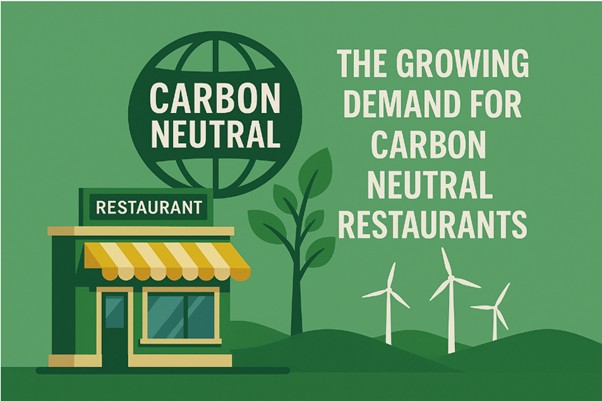
The Growing Demand for Carbon Neutral Restaurants
As the world becomes increasingly climate-conscious, restaurants are at the forefront of environmental responsibility. One significant movement capturing attention is the rise of carbon-neutral restaurants—businesses that take responsibility for their environmental impact by reducing and offsetting their carbon emissions. More than just a sustainability buzzword, carbon neutrality is quickly becoming a benchmark of trust, innovation, and customer loyalty.
Chef Shajahan M Abdul, founder
of Restro Consultants Pvt Ltd (RCPL), said, “Carbon neutrality isn’t just about
environmental ethics. It’s about meeting the expectations of modern customers
demanding real action, not empty promises.”
So, why are diners gravitating
toward carbon-neutral restaurants, and how can establishments meet this growing
demand?
What Does ‘Carbon Neutral’
Really Mean?
A carbon-neutral restaurant
balances carbon emissions by implementing initiatives that reduce or offset them.
These could include switching to renewable energy, adopting energy-efficient
appliances, minimizing food waste, sourcing locally, or purchasing carbon
credits that support reforestation or clean energy projects.
Chef Abdul explains, “Carbon
neutrality is about accountability. It shows that you understand your
environmental footprint and are actively working to reduce it.”
Why the Shift Toward Carbon Neutrality?
Diners today care about the origin and impact of their meals—from farm to fork to footprint. Consumers are no longer satisfied with just tasty food; they want to know that their dining choices align with their values, including sustainability and environmental responsibility.
According to recent studies, nearly 70% of Millennials and Gen Z are more likely to support brands that take meaningful action on climate change. This trend is strongly echoed in the restaurant industry, with customers actively seeking eco-conscious eateries.
Restaurant consultants from RCPL reported a 40% increase in sustainability and carbon tracking inquiries in the last year. The message is clear: going green pays off.
How Carbon-Negative Restaurants Build Trust
Going carbon neutral not only protects the planet—it also earns long-term loyalty. Here’s how sustainability directly translates to customer trust:
1. Transparency
Carbon neutrality forces restaurants to audit their operations, track emissions, and be transparent about their sustainability efforts. Sharing these results builds credibility and trust with diners.
“Your sustainability data should be as accessible as your menu,” says Chef Shajahan M Abdul. “Transparency fosters connection.”
2. Tangible Impact
Carbon-neutral restaurants don’t just talk the talk—they walk the walk. Customers feel empowered knowing their dining choices actively contribute to climate solutions.
Chef Abdul adds, “Every meal becomes meaningful. That’s what today’s customer is looking for—an experience with impact.”
3. Differentiation
Carbon neutrality sets restaurants apart in a saturated market. According to restaurant consultants, it’s a clear signal of innovation and forward-thinking leadership—something customers admire and remember.
Steps to Become a Carbon Neutral Restaurant
Achieving carbon neutrality is a process, but it’s not impossible. With proper guidance from professionals like Restro Consultants Pvt Ltd (RCPL), restaurants of any size can achieve this.
1. Conduct a Carbon Audit
This involves calculating emissions from energy use, transportation, food sourcing, packaging, and waste. RCPL assists restaurants in conducting thorough carbon audits using advanced tools and software.
“You can’t fix what you don’t measure,” says Chef Abdul. “The audit is your blueprint for improvement.”
2. Reduce Emissions Internally
Use energy-efficient lighting, induction cooktops, low-emission transport, and local sourcing to lower your carbon footprint. Composting and innovative inventory practices can also reduce waste.
Chef Shajahan M Abdul encourages restaurants to make small but consistent changes. “Progress over perfection—start where you can, and build from there.”
3. Offset What You Can’t Reduce
No matter how efficient you are, some emissions are unavoidable. Purchasing carbon credits from verified organizations enables restaurants to support projects such as tree planting, solar energy initiatives, or methane capture.
RCPL helps match restaurants with legitimate offset partners to ensure their credits create real impact.
4. Communicate the Journey
Tell your customers what you’re doing, why it matters, and how they can participate in the change. Use your menu, website, and social media platforms to communicate your carbon-neutral status and progress effectively.
According to restaurant consultants, consistent storytelling is key to building trust and engagement.
Success Stories: Leading by Example
Several restaurants across the globe are setting the bar for carbon neutrality:
These examples prove that carbon neutrality isn’t just for big-name brands. With the right strategies, any restaurant can lead the way.
Overcoming the Challenges
Becoming carbon neutral has its hurdles—initial costs, operational changes, and staff training—but the long-term benefits outweigh them.
1. Cost Concerns
Sustainable practices may require upfront investment but ultimately lead to long-term savings through reduced energy bills, decreased waste, and improved efficiency.
Chef Shajahan M Abdul emphasizes, “Sustainability isn’t a cost—it’s an investment in your brand’s future.”
2. Resistance to Change
Change can be uncomfortable. That’s why staff education is key. RCPL provides sustainability workshops to help teams embrace eco-friendly practices with confidence.
The Future of Dining Is Carbon Conscious
The demand for carbon-neutral restaurants isn’t a trend—it’s a value shift. Customers want brands that align with their concern for the planet, and restaurants that answer that call will gain lasting loyalty and competitive advantage.
Chef Abdul says, “Your carbon footprint is part of your story. Make it a story your customers are proud to support.”
With the guidance of seasoned restaurant consultants and the expertise of Restro Consultants Pvt Ltd (RCPL), achieving carbon neutrality is possible and profitable.
Final Thoughts from Chef Shajahan M Abdul
Carbon neutrality is the new standard for restaurant excellence. It speaks volumes about a brand’s integrity, innovation, and commitment to the planet. As customers become increasingly climate-conscious, restaurants must adapt to meet their needs.
Chef Shajahan M Abdul puts it best:
“A carbon-neutral kitchen doesn’t just serve meals—it serves hope.”
Chef Abdul © Copyright 2024. All rights reserved.